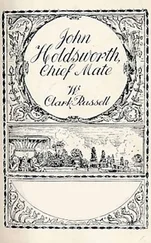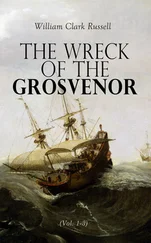William Clark Russell - John Holdsworth (William Clark Russell) (Literary Thoughts Edition)
Здесь есть возможность читать онлайн «William Clark Russell - John Holdsworth (William Clark Russell) (Literary Thoughts Edition)» — ознакомительный отрывок электронной книги совершенно бесплатно, а после прочтения отрывка купить полную версию. В некоторых случаях можно слушать аудио, скачать через торрент в формате fb2 и присутствует краткое содержание. Жанр: unrecognised, на английском языке. Описание произведения, (предисловие) а так же отзывы посетителей доступны на портале библиотеки ЛибКат.
- Название:John Holdsworth (William Clark Russell) (Literary Thoughts Edition)
- Автор:
- Жанр:
- Год:неизвестен
- ISBN:нет данных
- Рейтинг книги:3 / 5. Голосов: 1
-
Избранное:Добавить в избранное
- Отзывы:
-
Ваша оценка:
- 60
- 1
- 2
- 3
- 4
- 5
John Holdsworth (William Clark Russell) (Literary Thoughts Edition): краткое содержание, описание и аннотация
Предлагаем к чтению аннотацию, описание, краткое содержание или предисловие (зависит от того, что написал сам автор книги «John Holdsworth (William Clark Russell) (Literary Thoughts Edition)»). Если вы не нашли необходимую информацию о книге — напишите в комментариях, мы постараемся отыскать её.
presents
John Holdsworth, Chief Mate
by William Clark Russell
–
"John Holdsworth" tells the story of the chief mate of the ship 'Meteor' and his adventures and was written in 1875 by English writer William Clark Russell (1844–1911).
All books of the Literary Thoughts edition have been transscribed from original prints and edited for better reading experience.
Please visit our homepage literarythoughts.com to see our other publications.
John Holdsworth (William Clark Russell) (Literary Thoughts Edition) — читать онлайн ознакомительный отрывок
Ниже представлен текст книги, разбитый по страницам. Система сохранения места последней прочитанной страницы, позволяет с удобством читать онлайн бесплатно книгу «John Holdsworth (William Clark Russell) (Literary Thoughts Edition)», без необходимости каждый раз заново искать на чём Вы остановились. Поставьте закладку, и сможете в любой момент перейти на страницу, на которой закончили чтение.
Интервал:
Закладка:
Hours so spent would make just such a memory as would keep a man’s heart warm in his bosom under any skies, in any climes, in calm or in storm. Years after the very inscriptions on the tombs of the rector and Mrs. Flemming were scarcely to be read amid the encrusting moss and the toothmarks of time, John Holdsworth remembered that evening: how, flushed as the two Miss Lavernes were into positive prettiness by laughter and Mr. Jackson the curate’s discreet kisses, Dolly looked a queen to them; how her sweet eyes had peeped at him over the rector’s shoulder, as the worthy clergyman claimed his forfeit; how she hung about him and sported, as any infant might, at his side, with her laughter never so ringing and melodious as when her hand was in his. How the kindly grandmother had hobbled about the room, with rusty squeaks of laughter in her mouth, to elude the rector’s reluctant pursuit; how Miss Nelly Laverne blushed, and giggled, and tossed her head about when Mr. Jackson kissed her....
The curtain was falling, the lights were dimming, and now tears and sighs and heartrending yearnings were making a cruel ending of the pleasant summer holiday.
CHAPTER II. – TO THE DOWNS.
The “Meteor” was a full-rigged ship of eleven hundred tons, with painted ports and a somewhat low freeboard, which gave her a rakish look. Her figure-head represented a woman, naked to the waist, emerging from a cloud, and was really a sweet piece of carving. She was a ship of the old school, with big stern windows, and a quaint cuddy front and heavy spars. Yet, built after the old-fashioned model, her lines were as clean as those of an Aberdeen clipper.
She made a glorious picture, as she lay off Gravesend, the clear summer sky tinting the water of the river a pale blue, and converting it into a mirror for an ideal representation of the graceful vessel. Many boats were clustered about her side, and up and down her canvased gangway went hurrying figures. The ensign was at the peak, and at the fore floated the blue-peter, signal to those who took concern in her that she would be soon under weigh.
She was bound to New York, whence she was to carry another cargo south, ultimately touching at Callao before she spread her wings for the old country.
There were a few first-class passengers on board, and some of them stood near the gangway in low and earnest talk with friends, while others were on the poop, gazing at the shore with wistful eyes. One of these was a widow, whose husband had been buried a few weeks before in the churchyard of a little Kentish town. She was taking her boy back with her to New York, where her friends were; and there they stood, hand in hand, the child with wondering eyes everywhere, the mother with a fixed gaze upon the land which was consecrated for ever to her heart by the beloved form it held.
The river was brilliant and busy with vessels at anchor or passing to and fro, with boats pulling from shore to shore, with the gay sunshine deepening and brightening the colours of flags, or flashing white upon the outstretched canvas, and trembling in silver flakes upon the water. Sailors hung over the forecastle of the “Meteor,” bandying jokes full of pathos, or exchanging farewells with wives and sweethearts, or male friends in boats grouped, with outstretched oars, around the bows of the ship. Some of the hands were aloft casting off the yard-arm gaskets, ready to sheet home when the boatswain’s pipe should sound. The wind—a light breeze—was north, a soldier’s wind that would take them clear of the river, and make a fair passage for them down Channel; and now they were only waiting for the captain to come on board with the pilot to start.
By eleven o’clock the ship was to be under weigh; and even as the clear chimes of the clock striking the hour floated across the river from the land, a boat pulled by three men swept alongside, and the captain, followed by the pilot, sprang up the ladder.
A tall, broad-shouldered young man stood at the gangway to receive them, and touched his cap as the captain came on board.
“All ready, Mr. Holdsworth?”
“All ready, sir.”
“Man the windlass then.”
“Ay, ay, sir.”
He was on the forecastle in a jiffy, and the thunder of his voice went along the deck and brought all hands to the windlass as if a line had pulled each man to his place. The boatswain’s pipe shrilled, the pilot’s face, coloured like mahogany, took an anxious expression; and then clank! clank! clank! went the windlass, followed in a moment by a hoarse song, which at regular intervals burst into a chorus:—
“And when you come to the dockyard gates,
Yo, boys, yo!
You’ll find that Sal for her true love waits,
Heave, my bully-boys, heave!
Then, heave my boys, oh, heave together!
Yo, boys, yo!
And get her out o’ the stormy weather!
Heave, my bully-boys, heave!”
Then came such cries as these:—
“Sheer off you boats there!”
“Get the gangway ladder in-board.”
“Loose the inner jib, one of you!”
“A hand aft to the wheel!”
To see young Holdsworth now was to see a sailor, with a voice like a gale of wind, the whole great ship and her thousand complications of spars, ropes, sails, packed, so to speak, like a toy in the palm of his hand.
The skipper was below; the pilot was lord and master now, and Holdsworth watched his face for orders.
Soon the cable was up and down, the anchor lifted, and some hands left the windlass to make sail. The tide had got the ship, and she was floating almost imperceptibly past a large American vessel that had brought-up the evening before. A few boats followed; some turned and made for Gravesend, the inmates standing up and waving their hats and handkerchiefs.
By this time the anchor was catted, and all hands quitted the forecastle to make sail. Then you might hear cries of “Sheet home!” from the air; down fell great spaces of canvas like avalanches of snow; chains rattled through blocks; fore and aft songs and choruses were raised and continued until silenced by the order “Belay!” The yards rose slowly up the polished masts and stretched the canvas tight as drum-skins. The men on board the Yankee crowded her forecastle and gave the Britisher a cheer as she passed. Amid the songs of the men, the piping of the boatswain and his mates, and the noisy commands of the pilot, the “Meteor” burst into a cloud of canvas, chipped a white wave out of the blue river, and went ahead like a yacht in a racing match.
The breeze freshened as the river widened. The decks were quiet now, the ropes coiled down clear for running, and everything hauled taut and snug. At two o’clock she was foaming along under royals and flying-jib, whisking past colliers dragging their main channels through the water as if they were drowning flies struggling for the land; overhauling smart schooners and ships as big as herself, and making the land on either side of her dwindle down and down into flat marshy country.
The pilot, pompous to the last extremity, with bow legs and moist eyes, strutted fore and aft the poop, sometimes calling an order to the man at the wheel, and constantly looking aloft, ahead, and around him. The passengers lounged about the deck or hung over the side, watching the foaming water rush past them, and almost losing—those of them, at least, who were leaving their homes—their sadness in the sense of exhilaration begotten by the swift speeding of the vessel through the glory and freshness of the summer afternoon.
Forward, the men were industrious in the forecastle, rigging up their hammocks, or preparing their bunks for the night, or overhauling their sea-chests, or the canvas bags which, among seamen, often answer the purpose of sea-chests. It was a queer sight to see their busy figures in the twilight of the forecastle—here the black face of a negro; there the broad features of a Dutchman; here a mulatto; there a lantern-jawed Yankee, peak-bearded and narrow-hipped—a world in miniature, something after the nature of a menagerie, all talking in English, with accents which made the effect indescribable gibberish to the unaccustomed ear. They were most of them friends already; some had sailed in company before; and now they would suspend their work to offer one another a chew of tobacco, to beg the loan of a “draw,” meaning a pipe; while the air grew insufferable to all but a seaman’s digestion, with the smell of black cavendish and the inexpressible odour of bilge-water, tar, hemp, and the ship’s cargo generally, which rose, directly through the fore-hatch, and was blown into the forecastle by the draught under the foresail.
Читать дальшеИнтервал:
Закладка:
Похожие книги на «John Holdsworth (William Clark Russell) (Literary Thoughts Edition)»
Представляем Вашему вниманию похожие книги на «John Holdsworth (William Clark Russell) (Literary Thoughts Edition)» списком для выбора. Мы отобрали схожую по названию и смыслу литературу в надежде предоставить читателям больше вариантов отыскать новые, интересные, ещё непрочитанные произведения.
Обсуждение, отзывы о книге «John Holdsworth (William Clark Russell) (Literary Thoughts Edition)» и просто собственные мнения читателей. Оставьте ваши комментарии, напишите, что Вы думаете о произведении, его смысле или главных героях. Укажите что конкретно понравилось, а что нет, и почему Вы так считаете.












